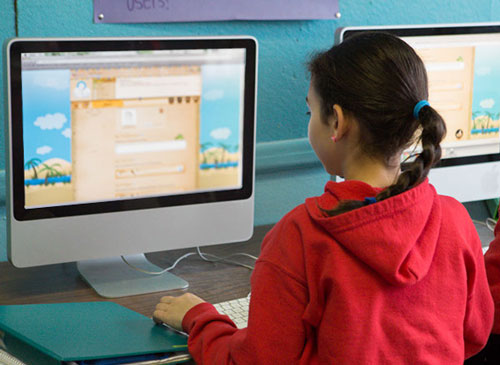


Welcome to the IS-21 Parent module where you will find lots of information about the IS-21 software, the Inquiry Process and Information Literacy skills, as well as tips on how you can support your child as s/he uses IS-21. As a first step, check out our brief video to learn why we care about being information literate.
When researching a complex topic, the inquiry process provides a series of useful steps and strategies designed to engage and empower children.
The Inquiry Process is designed to create independent learners by providing a framework for learning that encourages critical thinking, self regulation, and the expansion of knowledge. Your child will be encouraged to create his/her own meaningful and complex "Big" question that will drive the entire process.
As the process unfolds, s/he will learn a set of skills and dispositions that will enable them to: break a complex question down into researchable sub-topics, develop effective search strategies in order to zero in on relevant material to address each of the sub-topics, become critical consumers of information by questioning the credibility of the sources found, develop strategies to synthesize facts and opinions about each of the sub-topics and draw conclusions, and creatively communicate this new understanding to a given audience.
 Information Literacy (IL) is the ability to articulate, locate, organize, interpret, evaluate, synthesize, and use information from a variety sources.
Information Literacy (IL) is the ability to articulate, locate, organize, interpret, evaluate, synthesize, and use information from a variety sources.
A number of national associations have recognized the critical importance of teaching information literacy skills (Canadian Association of School Libraries, 2007; Conference Board of Canada, 2013; Association for Teacher-librarianship in Canada & Canadian School Library Association (CSLA), 1997) and the American Library Association of School Librarians (2007) who has prepared Standards for the 21st Century Learner which provides a set of standards or learning outcomes for each of the information literacy sub-skills.
Traditionally IL skills centered on print-based texts, often found in libraries. However, with the rise of newer technologies, the focus of IL skills has gone beyond traditional texts. To be information literate, individuals need to be become critical consumers of information and effectively identify, gather, manage, use, and present information from a diversity of multimedia sources.
IL skills are not limited to school-based situations. They can also be used for daily inquiries, or critically looking at different information sources one encounters. Key components for the development of new literacy skills for the 21st century include an emphasis on information and media literacy, critical thinking and problem solving, and self regulated learning. So IL is not just about learning how to search and use information in an academic setting, but broadly speaking is about being a critical consumer of information in the 21st century!!
 Inquiry Strategies for the Information Society of the Twenty-First Century (IS-21) is web-based software designed to teach your child information literacy skills, considered important and necessary skills in the knowledge-based society that we live in.
Inquiry Strategies for the Information Society of the Twenty-First Century (IS-21) is web-based software designed to teach your child information literacy skills, considered important and necessary skills in the knowledge-based society that we live in.
IS-21 supports and guides children through the inquiry process. This process is divided into three phases, each consisting of easy-to-follow steps to help your child learn to articulate, locate, evaluate, organize, interpret, synthesize and use information effectively-all considered information literacy skills.
IS-21 can be used in any subject area. What is fundamental is that your child selects a complex researchable question that is important to them. If they are given superficial questions to research then their experience will likely seem pointless.
In each of the steps, we have identified the skills that your child will need to learn, have built cognitive tools to help them develop those skills, and provided multimedia support to ensure that the material does not overwhelm your child.
The Guided Mode provides structure and support as your child proceeds through each of the 12 steps of the inquiry process
The Flexible Mode has combined some of these steps and provides the learner with some flexibility in determining which features will be used.
In this mode, your child proceeds through a 12 step process with each step linked to the previous one. They initially work through the steps in order but are encouraged to revisit previous steps when needed. This mode is ideal for any students who are new to the inquiry process and ready to develop all aspects of IL skills. The Guided Mode is sub-divided into 3 phases, and into 12 distinct steps. Check out the different phases for more information.
The Flexible Mode contains all of the features that are found in the Guided Mode however, some steps will be combined (there are 8 steps instead of 12), and only the core features of the tool will be present. Your child can determine which additional features they will need to complete each step. This mode is ideal for individuals who have acquired some Information Literacy skills but require development of a specific skill. Or it may be used by younger learners as a means of introduction to a specific Information Literacy skill, such as how to prepare a search strategy for a search engine.